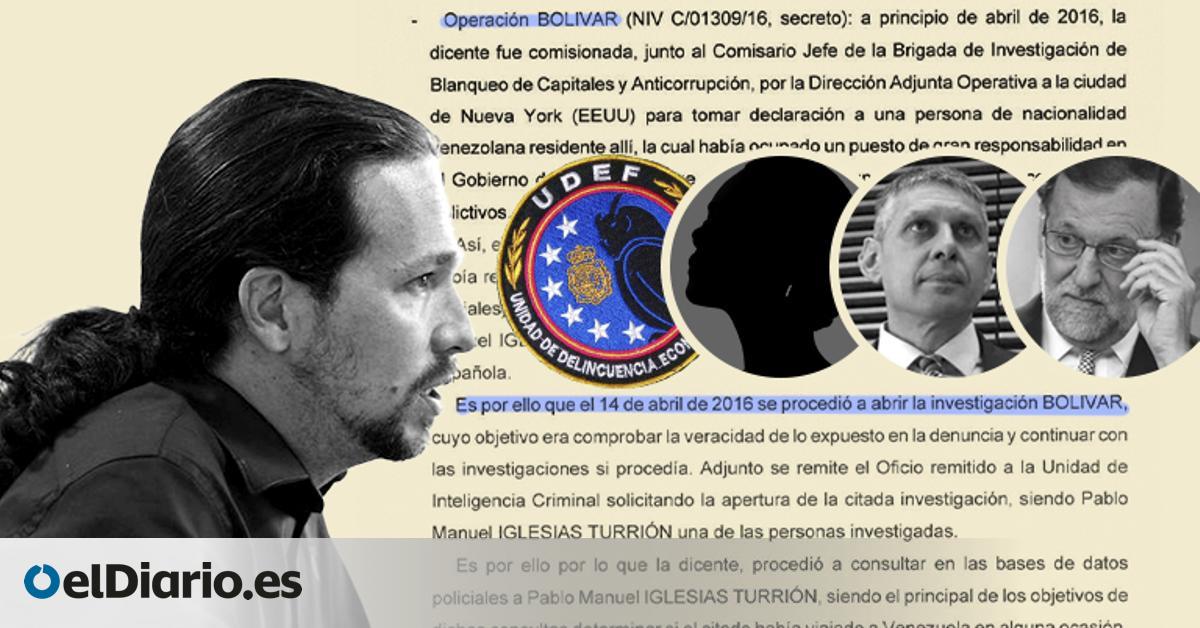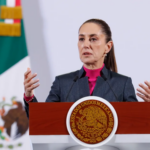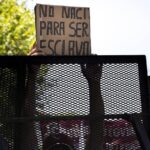
The judicial investigation of the police maneuvers against Podemos during the last Government of the PP advances with difficulties. The National Police resists delivering the reports housed in their databases on the inquiries suffered by training politicians even when they were deputies. The last response of the Police has been to claim that two of the operations that the body itself recognized to the National Court, baptized as Venus and Bolívar, have the qualification of “secret passives”, that is, that its content is confidential even though they have been closed provisionally for eight years.
An Inspector of the UDEF recognized before the judge in a report last November the police works on Podemos on two fronts during 2016, when the training had the possibility of integrating a coalition government with the PSOE. He explained that they received the commission of developing the content of the so -called PISA Report (Pablo Iglesias Sociedad Anónima), a dossier without signature or seal that the courts rejected flat, and launched Operation Venus. And a second commission to deepen the line opened by the Political Brigade on their trip to New York, with which they tried to obtain information against the party of a former minister of Hugo Chávez, Operation Bolívar.
After that report by the Udef inspector, Podemos, who exercises the particular accusation at the National Court, requested the complete content of these police investigations of 2016. The judge agreed to the measure, but the police have responded that it is a “secret” classified documentation.
In order for a document to acquire that category there must be a previous agreement of the Council of Ministers. This is the reason that has alleged the legal representation of the party and that Judge Pedraz has assumed, which in a providence of March 13 requires the UDEF of the Police to refer “the resolution that declares the classified matter the documentation that is required”. It is about to see what obstacle now presents the Udef with the approval of the current Police Directorate.
The cause that is followed at the National Court is the only instrument that offers some possibility of clarifying the front of the dirty war against Podemos in the Interior Ministry of the PP. This is evidenced by the last appearances in the Congress of the political leaders of the time, as former president Mariano Rajoy, who was his Interior Minister, Jorge Fernández Díaz, or the general secretary of the PP of that time, María Dolores de Cospedal. All deny knowing any irregular action of the police against the opposition and in the case of Fernández Díaz and Cospedal both reject the evidence of their statements in the published audios. Fernández Díaz came to attribute it to the “artificial intelligence” and Cospedal said they were “edited.”
The cause at the National Court opens some doors that sometimes close again. It recently occurred with the providence of Judge Pedraz requesting the Police, at the request of Podemos and with the Agreement of the Prosecutor’s Office, to send him “how many notes, minutes, proceedings, trades, appearances, attestors or reports that have been prepared” on deputies and former deputy of Podemos.
The judge’s order established the safeguard that those secret reports were not attached to the answer. And to this have been added new obstacles that arrive from the accused in the case, as is the case of former Secretary of Security State Francisco Martínez, who resorted to the information about the CEPS Foundation being out, as established by the admission order to process the complaint of the complaint. The judge accepted and now we can pretend that Pedraz rectify claiming that this line of investigation affects the then deputies Pablo Iglesias, Alberto Montero and Íñigo Errejón, among others, and that the investigations against them are subject to the procedure.
For now, the police have sent hundreds of folios to court where inquiries about the party and its members referring to security matters prevail, such as risk reports on types of terrorist threats or others that could suffer political formation. Also steps on risks detected by the head of security of the party and that made the Ministry of Interior to the knowledge of the Ministry.
Orders to the Udef
Operation Venus that claims we can part of the trip to the United States of several police officers in April 2016. The Chief Inspector informed the judge that on his return he consulted databases reserved to discover possible trips of Pablo Iglesias to Venezuela and that the Prosecutor’s Office later rejected an investigation with such flimps. That operation was baptized by the Udef as Bolívar and declined at three months. By then, the ABC newspaper had published the accusations against Podemos, just six weeks after the general elections.
The Chief Inspector also revealed that one of her subordinates and she also made other consultations about Pablo Iglesias from another investigation, which tried to bleach the PISA report, about the alleged financing of Podemos from Iran and Venezuela. That dossier, whose authorship nobody recognizes, was delivered by the police itself to the UDEF to start an investigation that also failed. Ten months were investigating the agents of the specialized unit, between February and December 2016.
The dynamic is repeated. The confidential and OKDIARIO published the content of the dosier in January 2016, coinciding with the beginning of the negotiations between PSOE and Podemos to form a leftist government. Udef’s research was baptized in this case as Operation Venus.
Source: www.eldiario.es

